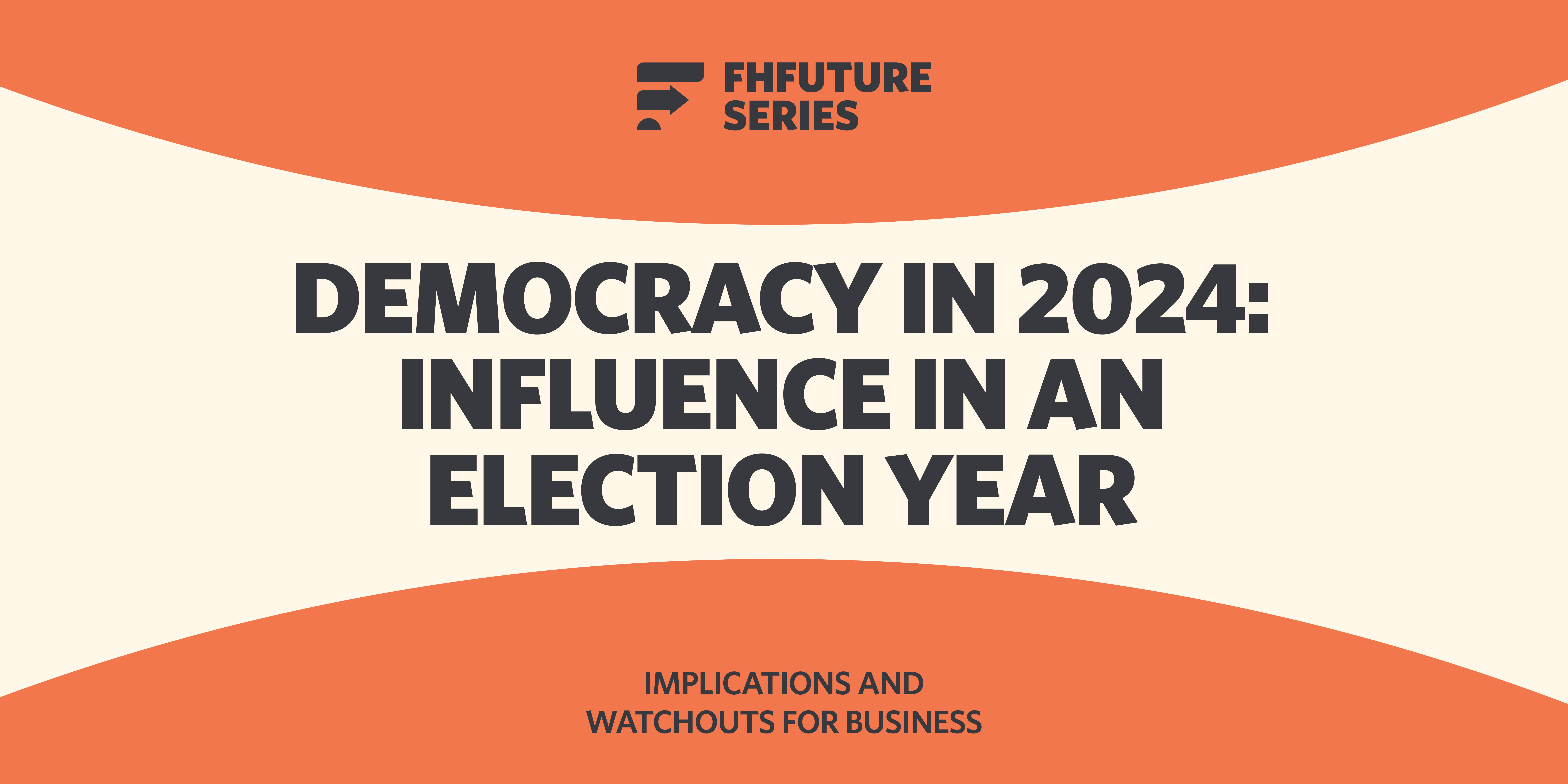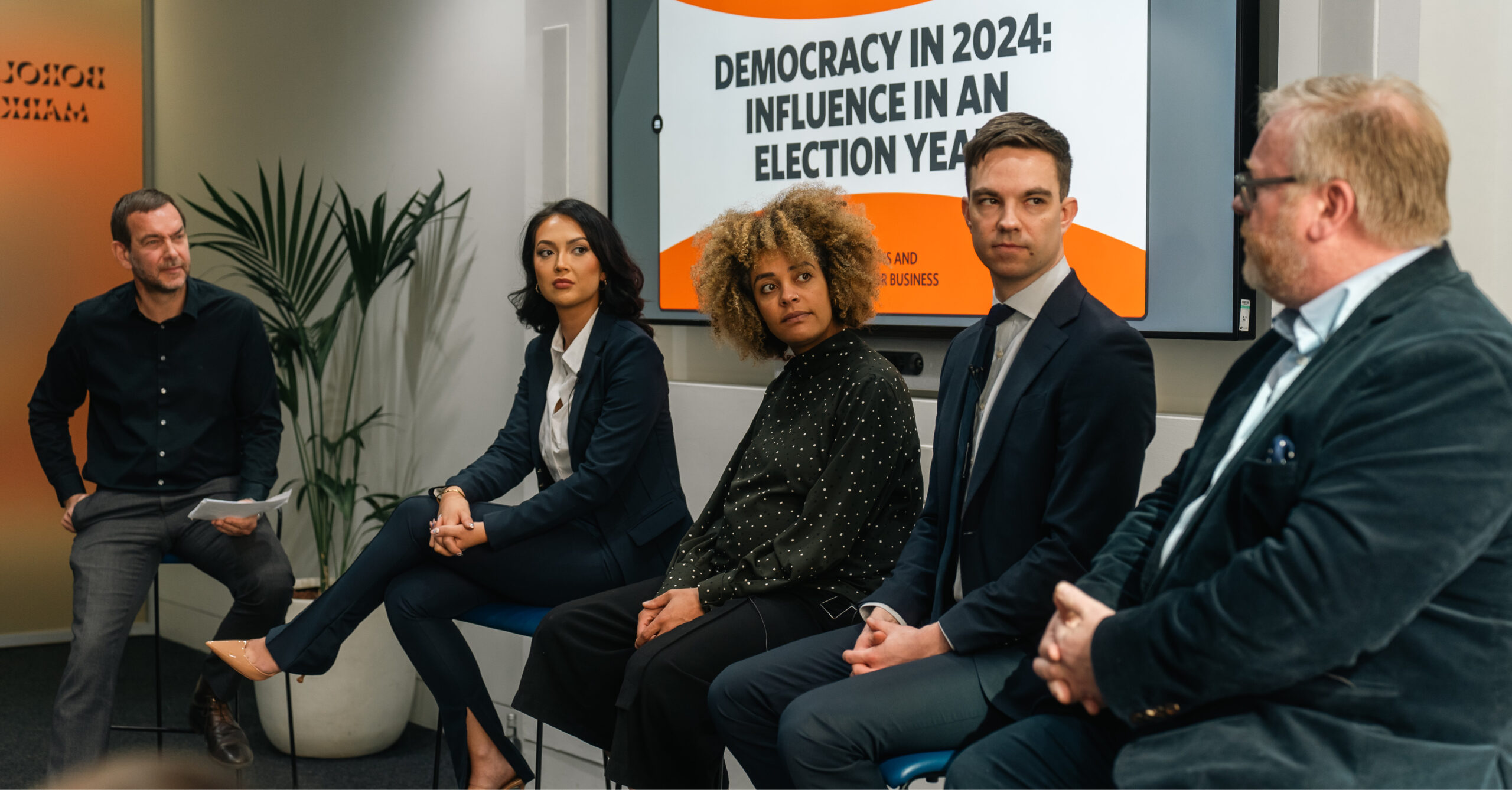Democracy in 2024: Influence in an election year

We hosted the first event of our FHFuture Series – Democracy in 2024: Influence in an Election year; Implications and Watchouts for Business.
Among the speakers were journalists, influencers, youth and industry regulatory experts who each contributed unique and insightful perspectives from their industries and beyond.
With the help of FH’s Head of News, Pete Meikle, Head of Public Affairs, Liam McCloy and the Consumer Team’s Nina Bautista, they delivered a fascinating discussion on topics from influencers playing a role in election and political campaigns to how brands can use their voices to navigate the unpredictable landscape to negative implications of ‘authenticity’.
We want to thank everyone for coming and for those who couldn’t make it this time, we have a few key session highlights below.
The Evolving Landscape…
Influencers have become an essential cog in the wheel of popular culture for years. Increasingly Governments and politicians are working with them to reach those audiences that are harder to reach through more ‘traditional’ channels. In 2024 – a tumultuous year of elections, global conflict, mis and dis-information we will see influencers play a more important and prominent role than ever before.
With so many news sources, for parties and their advocators it is a challenge to get the right key messages across. Aubrey Allegretti, noted it is “the newspapers’ initiative to tell a wider story [but] people make [their electoral] decision based on a smaller perspective.” That’s where the political influencers come in.
In political discussions on social media, where once outspokenness was vindicated, now it is vilified. Where once people used social platforms to explore new beliefs, according to Scott Guthrie, “consumers coalesce around people with a similar worldview.” To complicate the matter, it is no longer at the whim of papers to build the narrative; it is a trend for politicians to do media on their own terms.
Managing Reputation…
According to our panel, businesses and brands should take a stand on societal issues and encourage people to vote. But they also insisted the public don’t want businesses to take advantage of them. It’s about balance; businesses and brands remaining true to themselves.
When businesses choose to interact in this space it begins with choosing the right trusted messengers and, according to Sharon Gaffka, “it’s about getting the messaging across naturally.” But it’s also about businesses and brands targeting the right topics and not shoving things down consumers’ throats. Long term recognition is the aim of the game.

Maintaining Authenticity…
Whether it’s a conversation, a new restaurant or a business on social media, authenticity is the word on everyone’s lips.
But with the rise of deep fakes and misinformation, authenticity is becoming a challenge. Businesses need to balance the need to demonstrate they are who they say they are and that they’re a credible voice on the issues they claim to care about.
One of the key threats to authenticity is posed by influencers themselves. Businesses and brands must choose the right influencers and the right messaging, but paid content as a whole is something that needs to be addressed. Gillian Jackson suggested there is a “need to be safeguarding for influencers to stop this from happening and stop reliability from being changed by paid content.”
And when political parties get involved, the matter of authenticity is even more important. Sharon Gaffka suggested influencers should speak about issues they care about most to encourage genuine discussion, especially without a script. “Parties admitting there is a transaction by paying for content and media,” she said. “It’s an authenticity killer.”
Changing Expectations…
There’s no denying consumers expect more than ever before. When it comes to businesses and brands encouraging their audiences to vote, there’s a generational divide. FleishmanHillard research discussed in the panel found older generations express more opposition to businesses and brands encouraging unbiased voting. It is the opposite for younger people, but only when they agree with what the business is saying.
Nevertheless, Gillian Jackson suggested it was now a point of “non-controversy for brands to encourage people to vote.” She continued, “it is how they are going to show up, not if they should.”
A Note for Businesses and Brands From FH’s Marshall Manson…
Navigating this rapidly transforming political influencer landscape isn’t easy. Businesses and brands engaging in this space during an election year must be sure to listen, liaise and learn before putting themselves out there.
The social media sphere has only made things more complicated. While TikTok is predominately a non-political platform, Meta has said they are throttling the volume of political content it is serving to users. It is even actively warming down attention on profiles regularly posting about politics. It’s why working with micro-influencers who actively engage with specific communities is the best strategy moving forward, at least on these platforms.
Where to look for the purest political discourse? YouTube. When selecting influencers, be sure to prioritise those who direct their users from TikTok and Instagram to YouTube to encourage active, unstifled discussion.
As the Year of Elections continues, come back and connect with our team of experts at FH. It’s a fast-moving landscape and we’d love to help you navigate this new territory with campaign and content planning for the year ahead.
Find Out More
-
Changing Communications Tack at Mobile World Congress
February 21, 2024
-
Big pharma gets a big brand boost
November 20, 2023


